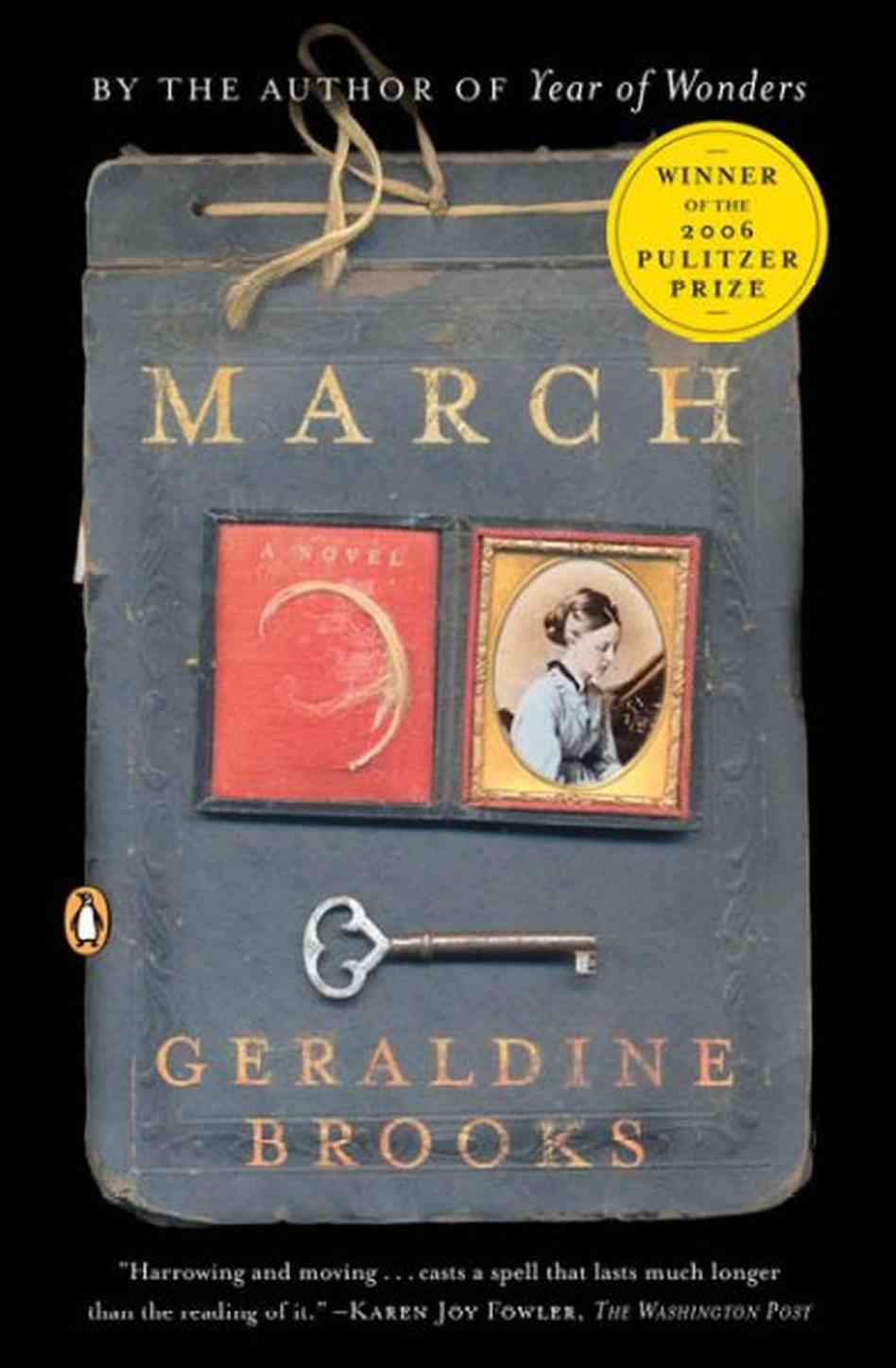09 Aug / March by Geraldine Brooks

 “‘I’ve always imagined paradise as something like a library,'” the titular March expounds. Is that not a perfect thought?
“‘I’ve always imagined paradise as something like a library,'” the titular March expounds. Is that not a perfect thought?
Alas, while March is Geraldine Brooks‘ most award-winning – that yellow circle on the cover announces its 2006 Pulitzer Prize – I must confess it was my least favorite; if I had to rank Brooks’ fiction, I’d go with Year of Wonders, Caleb’s Crossing, People of the Book, and then finally March.
[If you choose to listen to March, you’ll be read to smoothly enough by Canadian actor Richard Easton, with only the occasional overwrought moments (perhaps accurate to the text, but a bit too much stuck in the ears). As countless audibles have multiple narrators, I was surprised that Easton also reads Mrs. March’s chapters, a production decision that seemed unnecessarily dissonant.]Many of you probably have read Louisa May Alcott’s canonical Little Women, or at least seen some production of it, either on film or the stage. In March, Brooks attempts “to create a character for the absent father,” who in Alcott’s original, is away serving the Union troops as a minister in the south during the Civil War. As Alcott based Little Women on her own family, Brooks “turn[ed] to the journals, letters, and biographies of Alcott’s father, Bronson,” to create her own Mr. March.
Brooks’ Mr. March “goes off to war at the ridiculous age of thirty-nine,” as his wife observes. An idealistic thinker and passionate abolitionist, March’s wartime experiences with slaves, soldiers, civilians, and survivors – including his reunion with a remarkable woman he met 20 years earlier with whom he shares horrifying secrets – prove brutal, wrenching, and almost fatal. His difficult letters home to his little women are interwoven with his own remembrances of things past, from his travels as an itinerant 18-year-old peddler from Connecticut to a pencil-making apprentice to husband, father, scholar, preacher, rich man, poor man in Massachusetts. As he tries to make sense of the devastations of war, he’s forced to rethink his beliefs, his actions, his very life.
So why did March drop to the bottom of my Brooks list? Perhaps my contrary nature is blinding me, but Mr. and Mrs. March both, for all their admirable ideals and convictions, are ultimately unsympathetic characters. The mister’s guilty whimperings and self-lashings begin and end the book, while the missus’ ‘no-really-I-don’t-blame-him-but-woe-is-me-anyway’ whining overwhelms her short four chapters. Surely Alcott had reason to leave Mr. March a minor character, and Mrs. March secondary to her four daughters … given how they turned out in Brooks’ imaginings, to keep them from center stage was probably the wiser choice.
Tidbit: One of my favorite books ever is Wide Sargasso Sea, in which Jean Rhys gives unforgettable voice to the madwoman in the attic from Charlotte Brontë’s Jane Eyre. Sea is one of many, many parallel novels, as this genre is called, which includes such notables as Valerie Martin’s Mary Reilly (from Robert Louis Stevenson’s The Strange Case of Dr Jekyll and Mr Hyde); Alice Randall’s The Wind Done Gone (from Margaret Mitchell’s Gone with the Wind); Gregory Maguire’s Wicked (from L. Frank Baum’s The Wonderful Wizard of Oz) or his Confessions of an Ugly Stepsister (from Cinderella); and even Michael Cunningham’s (overrated 1999 Pulitzer Prize-winning) The Hours (from Virginia Woolf’s Mrs. Dalloway).
Readers: Adult
Published: 2005
